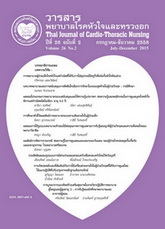ประสิทธิผลของรูปแบบการมีส่วนร่วมของครอบครัวเพื่อครอบครัวไทยไร้ควันบุหรี่
Keywords:
รูปแบบการมีส่วนร่วมของครอบครัว, การมีส่วนร่วมของครอบครัว, การเลิกบุหรี่, family participation model, family participation, smoking cessationAbstract
การวิจัยกึ่งทดลองแบบวัดผลก่อนหลังกลุ่มเดียวครั้งนี้มีวัตถุประสงค์เพื่อทดสอบประสิทธิผลของรูปแบบการมีส่วนร่วมของครอบครัวในการช่วยให้ผู้สูบบุหรี่ลดเลิกบุหรี่ คัดเลือกกลุ่มตัวอย่างแบบเฉพาะเจาะจง เป็นผู้สูบบุหรี่และสมาชิกในครอบครัวจำนวน 260 คนที่มารับบริการในคลินิกฝากครรภ์ คลินิกหลังคลอด คลินิกเด็กดีหรือหอผู้ป่วยเด็กของโรงพยาบาล 9 แห่ง เข้าร่วมในรูปแบบการมีส่วนร่วมของครอบครัวเป็นระยะเวลา 3 เดือน ประกอบด้วย 3 ระยะคือ ก่อนการเลิกบุหรี่ เลิกบุหรี่ และก่อนจำหน่าย แต่ละระยะพยาบาลมีบทบาทเสริมสร้างพลังอำนาจและการมีส่วนร่วมของครอบครัว ครอบครัวและผู้สูบมีบทบาทร่วมวางแผนค้นหาวิธีการและแรงจูงใจ ตัดสินใจเลือกวิธีปฏิบัติ ร่วมปฏิบัติการเลิกบุหรี่และร่วมประเมินผลสำเร็จ เครื่องมือวิจัย คือ รูปแบบการมีส่วนร่วมของครอบครัว และคู่มือการใช้รูปแบบ แบบสอบถามสำหรับผู้สูบบุหรี่ประกอบด้วยแบบประเมินระยะการเปลี่ยนแปลงพฤติกรรม และแบบประเมินระดับการติดนิโคติน แบบสอบถามสำหรับครอบครัวของผู้สูบบุหรี่ ประกอบด้วยแบบประเมินพฤติกรรมการช่วยเลิกบุหรี่ แบบประเมินการรับรู้ความสามารถและความตั้งใจในการช่วยเลิกบุหรี่ วิเคราะห์ข้อมูลด้วยสถิติเชิงบรรยาย และ สถิติที (Paired t-test)
ผลการวิจัยพบว่า สมาชิกในครอบครัวมีการรับรู้ความสามารถในการช่วยเลิกบุหรี่และมีพฤติกรรมการช่วยเลิกบุหรี่สูงกว่าก่อนใช้รูปแบบอย่างมีนัยสำคัญทางสถิติ (p<.05, <.001) ผู้สูบบุหรี่มีระดับการเสพติดนิโคตินลดลงอย่างมีนัยสำคัญทางสถิติ (p<.001) ข้อเสนอแนะในการปรับปรุงรูปแบบใหม่ในการลดเลิกบุหรี่ คือ 1) ควรปรับให้เป็นบทบาทหลักของพยาบาลที่ปฏิบัติงานกับครอบครัว 2) เพิ่มการมีส่วนร่วมกับเครือข่ายที่ช่วยในการควบคุมยาสูบ 3) การเพิ่มสิ่งจูงใจที่เป็นรูปธรรม 4) การเพิ่มสื่อหรือตัวแบบในการเลิกบุหรี่ที่ผู้สูบและครอบครัวเข้าใจได้ง่ายทั้งทางบวกและทางลบ
งานวิจัยนี้ชี้ให้เห็นว่า รูปแบบการมีส่วนร่วมของครอบครัวช่วยสร้างเสริมพลังอำนาจของครอบครัวในการช่วยเลิกบุหรี่ ช่วยสนับสนุนให้ครอบครัวมีส่วนร่วมในการแก้ไขปัญหาสุขภาพในครอบครัว และสามารถนำไปประยุกต์ใช้สร้างพลังอำนาจให้แก่ครอบครัวของผู้สูบบุหรี่ในชุมชนอื่น
Effects of family participation model for smoking cessation in Thai family
This quasi-experimental of one group pre-posttest research was aimed to investigate the achievement of Family Participation Model (F.P. model) for smoking cessation. 260 smokers and 260 family members receiving services at antenatal unit, postpartum unit, well-baby clinic, or pediatric ward in nine hospitals were selected by purposive sampling to participate in F. P. Model for 3 months. The F.P. Model consisted of three stages: pre-cessation, cessation, and pre-discharge. Nurse’s role in each stage should encourage empowerment and participation among smokers and their families. They independently planed their own motivation and smoking cessation method by choosing, employing and evaluating the outcome. Research instruments comprised F. P. Model and its manual, questionnaires for smoker’s stage of change and nicotine dependence form including questionnaires for family members’ perceived capability of smoking cessation, perceived benefits of smoking cessation, and intention of smoking cessation. Quantitative data were analyzed using descriptive statistics, and paired t-test.
The findings revealed that family members perceived capabilities to stop smoking and had smoking cessation behaviors significantly higher than before implementing the F. P. model (p<.05, p<.001). Smokers had nicotine dependence level significantly lower than before implementing the F. P. model (p<.001). Suggestion of new model of smoking cessation included: 1) nurses should have major role in directly working with family, 2) more collaboration with networks to support Tobacco control, 3) enhancing motivation with tangible example, and 4) providing more media and role models with positive and negative meaning and easily understanding.
This study indicated that the Family Participation Model could empower family members for smoking cessation. This model supported family members to participate in problem solving of health problem in family. This model should be applied for capacity building family members for smoking cessation in other communities.
Downloads
How to Cite
Issue
Section
License
บทความนี้ยังไม่เคยตีพิมพ์หรืออยู่ในระหว่างส่งไปตีพิมพ์ในวารสารอื่น ๆ มาก่อน และกองบรรณาธิการขอสงวนสิทธิ์ในการตรวจทาน และแก้ไขต้นฉบับตามเกณฑ์ของวารสาร ในกรณีที่เรื่องของท่านได้ได้รับการตีพิมพ์ในวารสารฉบับนี้ถือว่าเป็น ลิขสิทธิ์ของวารสารพยาบาลโรคหัวใจและทรวงอก






